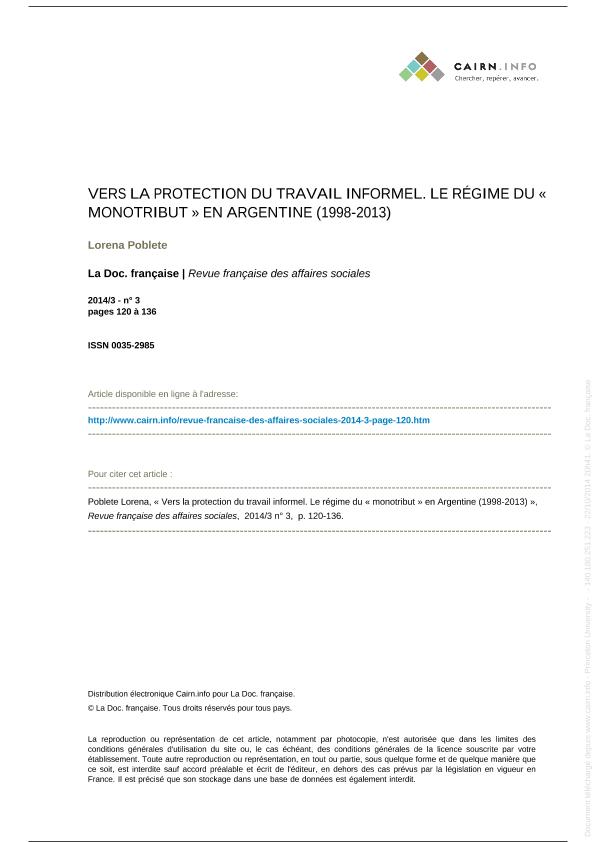Artículo
En Argentine, les travailleurs informels – définis comme ceux qui n’ont pas accès à une protection sociale – représentent depuis les années 1990 entre 30% et 40% de la population qui travaille. Dans les catégories plus touchées, on trouve les travailleuses domestiques (85% d’entre elles), les travailleurs ruraux (75%) et les travailleurs indépendants (60%). Le régime du «monotribut» est un dispositif innovant destiné à intégrer au régime fiscal et au régime de sécurité sociale les travailleurs ayant de bas revenus (salariés ou indépendants). Il cherche à simplifier l’inscription au régime de sécurité sociale de ces travailleurs ayant une capacité contributive limitée en instaurant une taxe originale qui réunit impôts et cotisations de sécurité sociale (maladie et retraite). Cet article cherche à analyser les implications du régime du «monotribut» – en tant qu’innovation institutionnelle – sur l’ensemble du système de protection sociale. Quelle est la nouveauté apportée par ce régime par rapport au modèle bismarckien en vigueur ? S’agit-il d’une innovation qui met en question la structure du système général et, par conséquent, qui marque la transition vers un nouveau régime ? Ou s’agit-il simplement d’une transformation dans ses marges ? Since the 1990s casual workers in Argentina – defined as those who do not have access to social coverage – account for between 30% and 40% of the active population. The hardest hit are domestic workers (85%), rural workers (75%) and self-employed or independent workers (60%). The monotribut system is an innovative measure aimed at integrating low-income workers (salaried or independent) into the tax and social welfare system. It also aims at simplifying the registration process for these workers who have limited contributive capacity. This will be done by introducing a new tax combining income tax and Social Security charges (illness and pension). This article will analyse the consequences of this monotribut regime – as an institutional innovation – on the welfare system as a whole. What innovation does this new system bring compared to the current Bismarkian model? Does this innovation call the structure of the general system into question? If this is the case, is it a sign of a transition towards a new system? Or is it simply a transformation to the current one ?
Vers la protection du travail informel. Le régime du monotribut en Argentine (1998-2013)
Título:
The monotribut regime in Argentina (1998-2013) – a move towards protecting casual labour
Fecha de publicación:
10/2014
Editorial:
La Documentation Française
Revista:
Revue Française des Affaires Sociales
ISSN:
0035-2985
Idioma:
Frances
Tipo de recurso:
Artículo publicado
Clasificación temática:
Resumen
Palabras clave:
Travail Informel
,
Monotribut
,
Protections Sociales
,
Argentine
Archivos asociados
Licencia
Identificadores
Colecciones
Articulos(CIS)
Articulos de CTRO.DE INVESTIGACIONES SOCIALES
Articulos de CTRO.DE INVESTIGACIONES SOCIALES
Articulos(SEDE CENTRAL)
Articulos de SEDE CENTRAL
Articulos de SEDE CENTRAL
Citación
Poblete, Lorena Silvina; Vers la protection du travail informel. Le régime du monotribut en Argentine (1998-2013); La Documentation Française; Revue Française des Affaires Sociales; 3; 10-2014; 120-136
Compartir




